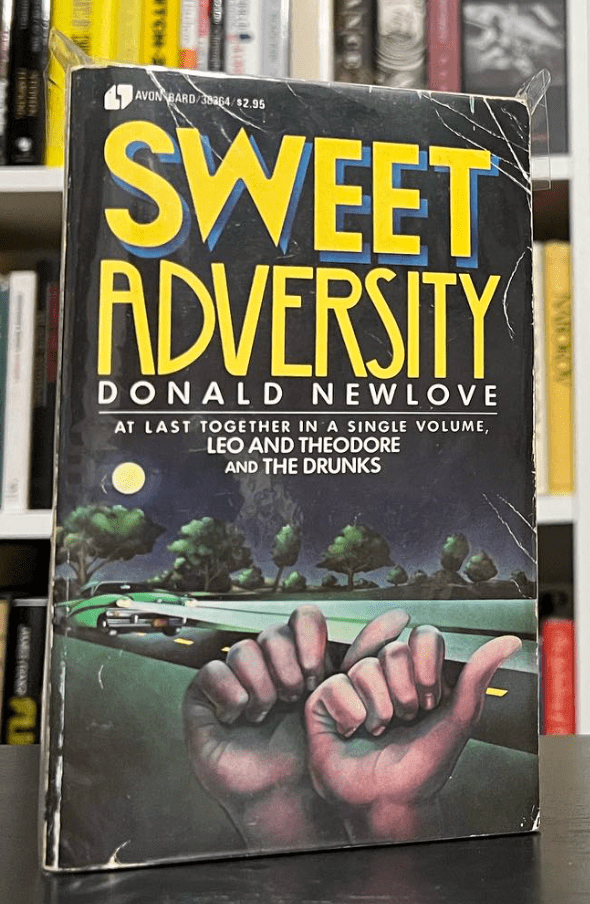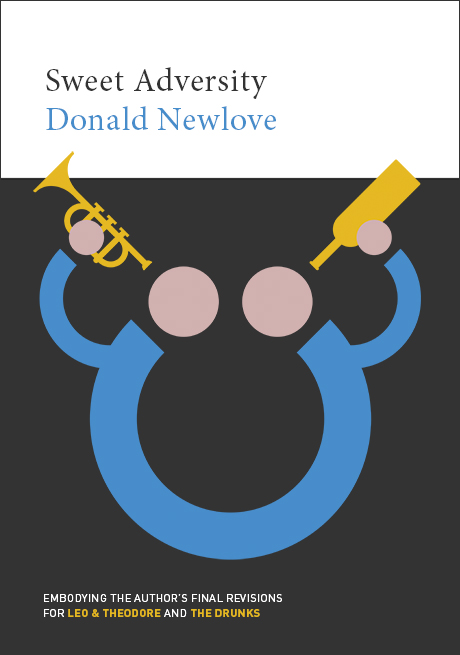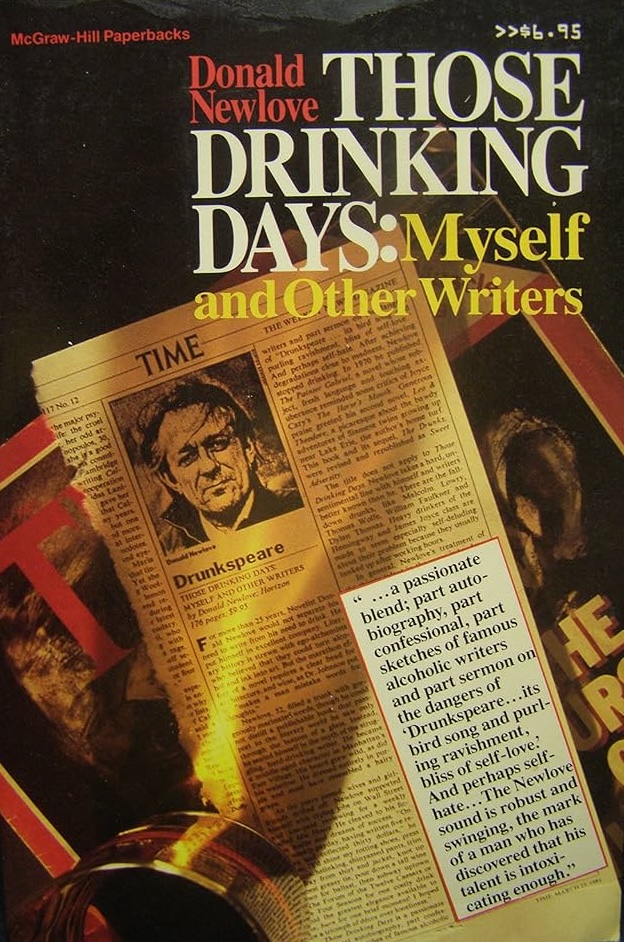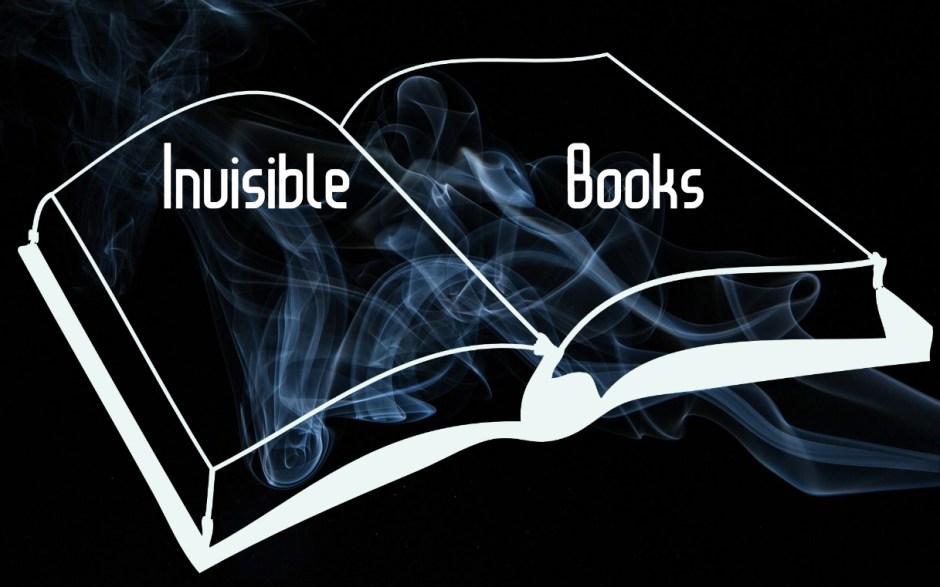
About Donald Newlove: Newlove was born in Erie, Pennsylvania, in 1928, and lived in New York City’s Greenwich Village up until his death in 2021. As a reporter, book reviewer, and short story writer, his work appeared in Esquire, New York Magazine, Evergreen Review, and The Saturday Review. His first novel, The Painter Gabriel (1970), was hailed by Time Magazine as “one of the best fictional studies of madness, descent, and purification that any American has written since Ken Kesey’s One Flew Over the Cuckoo’s Nest.” Newlove was the author of several other novels, a series of books on the art of writing, and the critically-acclaimed memoir, Those Drinking Days: Myself and Other Writers (1981).
I interviewed Donald Newlove here.
“Sweet are the uses of adversity / Which, like the toad, ugly and venomous, / Wears yet a precious jewel in his head…” – As You Like It by William Shakespeare
Donald Newlove’s Sweet Adversity is a Siamese novel about Siamese twins who “breathe as one with single heartbeats, hungers, energies, sleepings.” As it happens, the twin-books, not the book-twins, were separated at birth, the first half, titled Leo & Theodore (after our protagonists who, in turn, were named after Newlove’s favorite Russian writers) was published in 1973, and the second half, The Drunks, in 1974. Only in 1978 were they retroactively fused into a single book under the Shakespearean title (that English playwright always a wellspring for titular needs, as Nabokov poked fun at in his Kinbote poem: “But this transparent thingum does require / Some moondrop title. Help me, Will! Pale Fire.”). As it happens, that mass-market Siamese paperback was published by Avon Bard. Despite sharing a spine in that edition and the larger reprint brought out by Tough Poets Press in 2019, these two books are quite different from each other, if not outright opposed, notwithstanding their similarities, much like Leo and Theo themselves. It should be noted that Newlove disowned the separated twin-books in the ‘78 introduction, declaring that fused unit as the final version, after having had a “fresh chance to clear away the deadwood and more mindless make-believe of the early editions.”

Matters of birth and rebirth aside, I confess I came to this book with a certain expectation, partly my own fault and partly the fault of marketing (the New York Times called it “one of the most desperately funny books we’ve been given in a long time.”). At face value, one would expect a novel about alcoholic, jazz-playing Siamese twins to be comic and hyperbolic if not the stuff of outright cartoons. It also didn’t help having remembered the childhood Blockbuster rental Stuck on You (2003), a film from the brothers Farrelly, known for their raunchy comedies. In fact, the parallels between Stuck on You and Sweet Adversity are a bit too obvious to ignore—the alcoholism, the creative aspirations, the fallout, etc.—and I’d be surprised if the latter didn’t influence the former. Still, while there’s at least a nugget of sincerity in the unofficial Hollywood adaption, as in most Farrelly films, it still doesn’t rise to the heights of human lows and blows in Newlove’s work. That’s the thing: Sweet Adversity is far more adverse than sweet in nature, and even dubbing it a black comedy is a stretch. Simply put, it’s a deeply sad novel through and through. Far from some bubblegum-wrapper comic strip, this is a work of serious and profound literature. I’m reminded of the fact that Infinite Jest had been constantly praised for its humor at the expense of its tome-spanning melancholy (yet another novel borrowing from the Willspring, and, like Pale Fire, the title’s used self-consciously and flippantly [unlike Newlove’s sincere usage]: “‘The Face of the Deep’ had been the title she’d suggested for Jim’s unseen last cartridge, which he’d said would be too pretentious and then used that skull-fragment out of the Hamlet graveyard scene instead, which talk about pretentious she’d laughed.”) A “jest” is jolly, sure, but in the context of DFW’s novel, the oft-ignored bit, the “infinite,” suggests something wrong if not sinister. Whoever laughs day after day, year after year, decade after decade, is either on drugs, insane, or desperately attempting to mask a Robin-Williams-deep hurt. Having now found the source of the New York Times blurb previously mentioned, I see that it’s for The Drunks in particular, and it continues thusly: “…and one of the most frightening [books] since Robert Stone’s A Hall of Mirrors.” The blurb should not have been circumcised on the back of the Tough Poets edition.
The first half, a bildungsroman, has a heavy veneer of childhood nostalgia that partly softens the mounting darkness. I want to compare it to the first part of Dow Mossman’s American masterpiece, The Stones of Summer, but both books clearly owe themselves to Thomas Wolfe. Rather than Wolfe’s North Carolina or Mossman’s Iowa (I’d be remiss if I didn’t also mention the soul-aching Illinois as evoked by Ray Bradbury in Dandelion Wine), Newlove brings to life Pennsylvania, specifically his hometown of Erie. While the book as a whole is quite dialogue-heavy, this section is less so, and we’re treated to many beautiful and delightful descriptions of the past and the pastoral. It’s written in a telegraphic prose style, which is a bit jittery at first, yet it’s worth the modicum of effort required because it soon reads more smoothly as one adapts to the Joycean syncopation. There’s also a nutritious overdose of portmanteaus and hyphenated words that mirror the protagonists’ attached state. Here’s a typical example: “Walk down breezing Fairmount to the trolley. Moonpearl sky. Twins slip into the Lake House for a bag of beer, then buy four rides in the ticket office. Twenty-minute wait. Walk by the outlet where the dark City of King James steamer sits bonewhite on the marsh. They lie back, open beers, and share them. Cinnamongiving night, soothing, sapfilled, stars teasing the deeps.”
The seeds of well-nigh Hellenic tragedy are planted at the onset. Not only is their biological father a sickly alcoholic who they see little of, we later learn in passing that the twins were the product of rape, their Siameseness seemingly the sin of the father manifest. Despite expectations, Leo and Theodore are rarely bullied or treated differently. Aside from a revolving door of alcoholic men in the house, including a beer mogul führer who batters the twins’ mother, Stella, their childhood is generally one of joy and toothsome pleasure. They frequent the movie theater as budding cinephiles (admission compliments of a mother’s purloined purse money when they don’t simply sneak in the back way), and they’re especially fascinated by a double-feature of Frankenstein-Frankenstein’s Bride, one of the Hollywood creatures who they relate to, same with Jekyll and Hyde, not so much because of their handicap but because of the latent predisposition for alcoholism and the way that bestializes things (even their names suggest a chimera: Leo the lion and Teddy the bear). They conflate spirits with magic when their father lights a match and dunks it into a shot of whiskey, then raises it with flame intact. Indeed, they pick up a bottle well before they ever pick up a trumpet, their first drink being an ale with pineapple as they watch Gary Cooper play Marco Polo. Even earlier, among the “filth and flies of the hard lot,” “They sense deep mystery in these shameful scummed bottles.” Leo and Theo’s sister, Millie, tells them about A Star Is Born (the 1937 original), and they can’t understand why the guy wouldn’t quit drinking instead of drowning himself in the ocean. Millie says they’re too young but will understand one day. Absit omen futile, the ocean as excessive alcohol is something they’ll become all too familiar with.

The first section of Leo & Theodore is a consistent 97 pages. From there, fine cracks in the structure start to appear. After growing fond of Stella and Millie, for instance, the family thread is all but abandoned about halfway through. We barely hear in passing about Millie’s marriage or how the twins’ father “died in sugar shock on a windy corner in Erie while drinking.” The chronology only gets vaguer and more random. Therein lies one of the biggest flaws of the book, a lack of cohesive or logical structure. After getting their first job in a diner and recording some ad-libbed jazz songs with a friend, the twins suddenly work as nurses, taking care of an old man named Dale. He’s a successful businessman who has dementia and, although still third-person, the story mostly focuses on his point of view. Like the book in general, this masterful section mixes humor with deep pathos, leaving this reader emotionally distraught. A mere 23 pages in length, it’s my favorite, and I later learned in Those Drinking Days that Newlove had retroactively fit this into the novel from a longer, separate work, which would explain the sudden shift in perspective and the deeper descent into despondence, into existential dread and even body horror:
Dale outlasts his disease twenty years past the ten once hoped. He now has double pneumonia, both lungs full, breathes in sniffs, his heart strains weakened walls, his nerves go unsoothed by deadeners he’s taken for thirty years, his arteries are rock salt, his back a flame of blisters, he’s not eaten in twelve days, had water in ten, penicillin in eight, his pores are clogged with wax, mouth sealed with rime, his skin pulls apart if washed, he is blighted with rashes, sores and lesions, he’s lost fifty pounds, fungus cracks his feet, skin turns to horn, nails loosen, scalp infected, ringworm, chill, blindness, deafness—he is pulsing silt, a human Mississippi of infirmities in flood to the Gulf.
Overall, twin interiority isn’t needed in such a poignant and powerful piece because it can be hurtfully inferred, especially when, near the section’s end, the twins feel so sorry for Dale that they try to put him out of his misery before stopping at the last second. The next day, he finally dies: “Dale is gray slate. His mouth gapes without teeth, his nose stone, closed eyes sunken ridges. Stillness dusts him, torn limbs at one with eternity.”
The jump to another odd job continues into the next section, where the twins work for a highly questionable DIY ambulance business. They’re de facto paramedics who drive the ambulance but insist on not diagnosing anything. Instead, they do what little they can, possibly causing more harm in the process, and take the person, or the corpse, to the hospital. I was reminded of Martin Scorsese and Paul Schrader’s Bringing Out the Dead, although that film was both darker and funnier. Nicolas Cage’s character is an officially trained paramedic, but he also drinks on the job. Yes, by the time the twins are put in charge of other people’s lives, their alcoholism is in full swing. Only in passing and hundreds of pages later do we learn how traumatic the experience was for at least one of the two, Teddy saying with a lost-tooth lisp that far outstays what little amusement it can possibly bring: “Remember the purple bathtard we found thtuck with his ath in the air in the bathroom? Thome of those things we thaw and did drivin’ the ambulanthe—nothin’ can ever grow there again.”

The first of the Siamese books ends on a strange note indeed. In the spirit of the infamous literary pedophile Humbert Humbert, the grown-up twins fall for a young girl named Cynara, based on Newlove’s own long-lost nymphet (he had been 30, she 14). Leo and Theo decide to flee the state with her and start a life together. However, in true deconstructed fashion, The Drunks begins with no mention of this narrative thread. Only later do they bump into her and briefly catch up. Likewise, we learn in various degrees of passing that Leo is all of a sudden divorced (at what point did he even get married?) and has a kid named Stuart. For a novel that’s 600 pages of relatively tiny font, there’s no excuse for glossing over weighty scenes in exchange for a bunch of filler babble from flat and inconsequential tertiary characters, which is what the second book is chiefly made of. Other major dramatic scenes that get mentioned in anti-climactic dialogue include a miscarriage followed by a hospital rush, a drunk driving accident during which Stuart dangerously sits on the twins’ lap, and Leo’s drunken assault on his mother, which brings their broken upbringing full circle (“‘You don’t remember, Hyde?’ […] ‘Ya belted Mama, asshole.’”).
The Drunks also does away with the nostalgia and most of the humor, leaving the prose in between the dialogue as one of the few remaining driving forces for finishing the book. What’s left for Leo and Theo to do is hit rock bottom and get on the wagon. In true Jekyll and Hyde fashion, it’s Leo who joins AA while Teddy rages against the program and everything it stands for, which isn’t to say that Leo doesn’t have his fair share of relapses. They eventually find some other rocky bottoms, including almost getting killed by a metro train. The final bottom of bedrock bottoms is when the twins try to commit suicide by overdosing on pills. This leads to a slightly amusing limbo revery in which they talk to people inside a giant fish, including who else but a guy named Jonah? They manage to survive and it’s this incident that finally causes Teddy to join AA as well. The AA scenes are not as at the forefront of the book as they should be (the jazz-playing takes a back seat as well, just a few rows ahead of the nosebleed section where their opera-writing aspirations slump), except for the ending, which gives us an AA meeting in its candid entirety, a precursor to the more effective and memorable ones in Infinite Jest. The closest to those in the latter is a character who explains how the phone coalesced into the audible alarm of life’s stressful responsibilities and how it haunted him even after the power had been turned off and the phone taken away: “‘…when it kept on ringing I hid in the bathroom until it stopped. Oh! I’d lie on the bathroom floor. I cried so hard that I didn’t know I was praying. Praying? I was starved. My existence was totally unpeopled. My liquor was delivered to the door which I’d open just enough to take the bottle.”
Other passing tidbits of untapped plot include news from Cynara’s husband that she successfully committed suicide, leaving behind a child we hear of for the first time. We also learn that Leo is a deadbeat dad, having not seen his son in over a decade. The flux of characters and random structure could be partly attributed to Leo and Teddy’s frequent blackouts throughout the novel, but this is too much beneficial doubt for Newlove. These two novels were the second and third output of his sober years, beginning with his debut novel The Painter Gabriel, and should reflect that instead of seeming to be complicit in the protagonists’ sloppiness. This is Newlove regarding his shortcomings as an aspiring and drunk writer, some of which still apply to the soberly-composed Sweet Adversity: “My worst flaw: I had no genius, or gift for ideas, only grimness and a need to give my life meaning through the glory of words. Even worse for a writer, I had no power to invent stories, just desire and heartache, and strained to boost endings hovering on a catsmile. Boy, I admired Keats and Thomas Wolfe, I mean urgently. Their burnings and overflowings could help me hide my dumb endings. I felt stupid, never on top of my story, driven to blinding originality and making speech do the work of plot.” Were these shortcomings always there or did the many years of alcohol permanently instill them?
While I think Newlove did well to treat his twins as realistic rather than cartoonish, there are still lost opportunities for more humor. My scatological bias would have had me relishing a disgusting scene in which one twin has to release a monster-gnarly bowel movement, holding the other twin hostage to the toilet-booming bomb-drops and mustard-gas stench. As it happens, there is a skinny-dipping sex scene in which a girl puts her foot over their connective band, not to mention a scene of mutual onanism. Still, why is the fact that they’ve fellated each other mentioned in passing like everything else? although the delivery is still funny:
“Hey,” Mouthorgan asks, “can you guys suck each other off?”
“No!” Leo-Teddy croaks, shriveling, lying.
“Shit.”
And then there’s a threesome with a girl named Beverly that is surprisingly written with more sincerity and poetry than any grotesque humor:
Teddy rides the wall, eyes closed on sunmemories.
“Lovely,” Leo says.
“I never felt anything like this before!” she cries.
An angel dies, dropping through Leo’s earth.
[…]
All three feel waking wonder as the great bird fades with a part of their spirits.
I won’t go so far as to call the book maudlin, but I think its tenderness, its earnest outlook, comes from the fact that the twins are a stand-in for Newlove himself (his “unspeakable blood-joined twin” with a “pickled smile,” as he put it in his memoir), and perhaps he would have been a bit better off laughing at himself at least as often as he self-censures and -crucifies. Like Michelangelo’s prisoners, there’s a Great American Novel stuck in the marble block of this book, and while that image seems to fit all too well with the theme of aspirations snuffed, it’s still a disappointment. Again, it’s not as though this book were the product of alcoholic debilitation (let alone mortal arrest). Still, the ambition (whether tapped or untapped), the consistently beautiful and surprising prose, and the first of the two books make Sweet Adversity well worth the read.
***
Despite its heavy topic, Newlove’s 1981 memoir-cum-casual-literary-critique Those Drinking Days: Myself and Other Writers is a relatively light read (by design, mind you). I don’t consider myself a fast reader yet I knocked it out in two days. I was somewhat surprised by how much of Sweet Adversity is indeed autobiographical. Newlove rehashes many dramatic scenes that were mentioned in the novel, sometimes with extra details. For instance, he too had been an untrained ambulance driver, but we also learn that his “hair rose when one motel corpse was my father’s ringer.” Yet another lost opportunity for an affecting scene in Sweet Adversity.

Newlove stresses an important point, that alcohol adversely affects the quality of a writer’s work (he hammers this point by focusing on his “Dunkspeare” self, personal anecdotes of friends like Gil Orlovitz, and famous examples like Hemingway and Fitzgerald, ending in a long scene in which Newlove forces himself as a dinner guest in Tennessee Williams’ home, which is mildly interesting and only tangentially related to the thesis at hand). The same is true of other artistic aspects beyond quality, and this should be taken into consideration if it’s known that a work was written while under the influence (I’d call it a WUI but that sounds too much like bubbly baby talk).
Still, Newlove’s thesis is a bit too narrow because a writer’s oeuvre can’t be reduced to whether he or she had imbibed too heavily at the time or not. And while it’s true that alcohol can negatively affect one’s perception, he fails to mention or acknowledge the effect that opening Huxley’s doors of perception can have. In other words, what about hallucinogenics? Samuel Taylor Coleridge’s Kubla Khan is but one prime example, if we are to believe the origin story. I don’t doubt that most great works were written in spite of alcohol rather than because of it, but there’s still the possibility that spirits could have lubricated the muses in some cases. Passed out and drooling on the typewriter, no, but a good buzz is not necessarily debilitating (perhaps this is too easy for me to say, a social drinker who rarely socializes and thus rarely drinks).
Speaking of the muses, Newlove had toyed with the idea of a Siamese trilogy, the potential title of the third installment being The Higher Power. When I asked the nonagenarian Newlove about this, he said, “I never began work on The Higher Power. I decided that because my Siamese twins would remain joined there was not much more to say.” Regardless of this, Newlove had much more to say as a writer at large, self-publishing numerous works long after agents, publishers, and readers had forgotten about him. And it’s a testament to the man that, despite losing his wife, he himself died sober about four years later, at 93, not too long after I interviewed him. During our exchange, I asked him to write the first sentence of a novel he would never finish, and he produced this gem: “Who knows what heartbreak the wind will bring?”
Editor’s note: The aim of Invisible Books is to shine a light on wrongly neglected and forgotten books and their authors. To help bring more attention to these works of art, please share this article on social media. For early access to literary content like this and other awesome benefits, consider supporting The Collidescope on Patreon.
The Collidescope is an affiliate of Bookshop.org and will earn a small commission if you click through those specific links and make a purchase.
Listen to a discussion of this book between George Salis and Henry Gelinas on The Collidescope Podcast:


George Salis is the author of Sea Above, Sun Below. His fiction is featured in The Dark, Black Dandy, Zizzle Literary Magazine, House of Zolo, Three Crows Magazine, and elsewhere. His criticism has appeared in Isacoustic, Atticus Review, and The Tishman Review, and his science article on the mechanics of natural evil was featured in Skeptic. He is currently working on an encyclopedic novel titled Morphological Echoes. He has taught in Bulgaria, China, and Poland. He’s the winner of the Tom La Farge Award for Innovative Writing. Find him on Facebook, Goodreads, Instagram, Twitter, and at www.GeorgeSalis.com.


